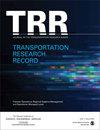基于深度q -网络的自动驾驶车辆队列合并方法
IF 1.8
4区 工程技术
Q3 ENGINEERING, CIVIL
引用次数: 0
摘要
对自动驾驶车辆进行队列合并控制,可以提高交通效率。然而,目前的排合并控制方法主要依赖于规则,这给实现最优控制带来了挑战。在本研究中,我们提出了一种基于深度q网络(DQN)的排合并控制方法。首先,我们指定车辆的状态和动作,并建立一套奖励函数,以确保安全驾驶。然后,利用DQN算法训练一个适合于合并网联和自动驾驶汽车控制的神经网络,使其连续逼近状态-值函数。最后,我们使用MATLAB仿真将所提出的方法与基于规则(RB)的车辆合并方法进行比较。特别是,在随机环境中使用这两种方法同时驱动自动驾驶汽车。仿真结果表明,所提出的基于dqn的车辆合并方法比RB方法所需的合并时间和车辆变道次数更少。此外,与不合并相比,合并可以提高中高交通密度的容量:CAV渗透率越高,改善幅度越大。我们在不同的初始条件下验证了所提方法的有效性。结果表明,该方法是一种安全、稳健的自动驾驶车辆队列合并方法,可用于提高高速公路和道路的通行能力。本文章由计算机程序翻译,如有差异,请以英文原文为准。
Deep Q-Network-Enabled Platoon Merging Approach for Autonomous Vehicles
Platoon merging control of autonomous vehicles driving in a platoon formation can improve traffic efficiency. However, current platoon merging control approaches primarily rely on rules, making it challenging to achieve optimal control. In this study, we propose a platoon merging control approach based on a deep Q-network (DQN). First, we specify the state and action of the vehicle and establish a set of reward functions to ensure safe driving. Then, the DQN algorithm is used to train a neural network suitable for merging the controls of connected and automated vehicles (CAVs) to continuously approach the state-value function. Finally, we compare the proposed approach with a rule-based (RB) vehicle merging approach using a MATLAB simulation. In particular, CAVs are driven simultaneously using the two approaches in a random environment. The simulation results show that the proposed DQN-based vehicle merging approach requires less merging travel time and fewer vehicle lane change times than the RB approach. Additionally, merging can result in improved capacity in medium and high traffic densities compared with no-merging: the higher the CAV penetration rate, the larger the improvement. We verify the effectiveness of the proposed approach for different initial conditions. We suggest that the proposed method is a safe and robust method for CAV platoon merging, and that it can be applied to increase the capacity of freeways and roads.
求助全文
通过发布文献求助,成功后即可免费获取论文全文。
去求助
来源期刊

Transportation Research Record
工程技术-工程:土木
CiteScore
3.20
自引率
11.80%
发文量
918
审稿时长
4.2 months
期刊介绍:
Transportation Research Record: Journal of the Transportation Research Board is one of the most cited and prolific transportation journals in the world, offering unparalleled depth and breadth in the coverage of transportation-related topics. The TRR publishes approximately 70 issues annually of outstanding, peer-reviewed papers presenting research findings in policy, planning, administration, economics and financing, operations, construction, design, maintenance, safety, and more, for all modes of transportation. This site provides electronic access to a full compilation of papers since the 1996 series.
 求助内容:
求助内容: 应助结果提醒方式:
应助结果提醒方式:


